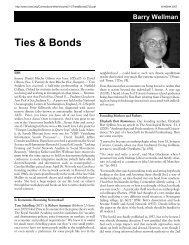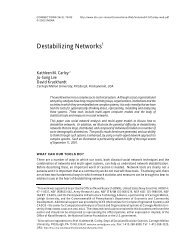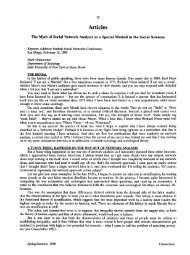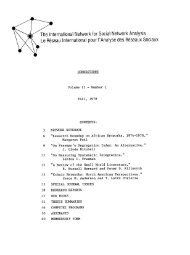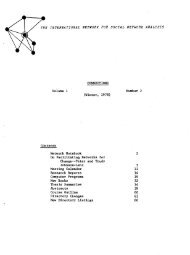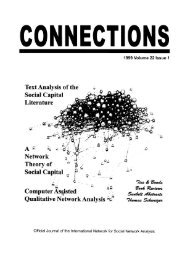(1979). Social Networks and Psychology. Connections, 2 - INSNA
(1979). Social Networks and Psychology. Connections, 2 - INSNA
(1979). Social Networks and Psychology. Connections, 2 - INSNA
Create successful ePaper yourself
Turn your PDF publications into a flip-book with our unique Google optimized e-Paper software.
- 87 -SOCIAL NETWORKS AND PSYCHOLOGYDavid M . Todd (U . of Massachusetts - Amhurst)For this first round-up I will attempt to broadly characterize the use of the social network conceptin psychology . Delineating this topic is, quite appropriately, difficult . The areas of social networkresearch in which psychologists are involved are thoroughly interdisciplinary . Moreover, some work doneby psychologists does not involve variables that are particularly psychological in nature, <strong>and</strong> some workwhich does have a distinct psychological focus (e .g . avowed happiness, cf . Brim, 1974) is not done bypsychologists . I will simply celebrate this condition, <strong>and</strong> not worry too much about the boundaries!Based on my own knowledge of the discipline <strong>and</strong> the stated interests of psychologists who belong to<strong>INSNA</strong>, I believe the greatest psychological use of the social network concept is in the study of socialsupport, mental health (or more broadly, psychosocial adaptation), <strong>and</strong> the development of both professional<strong>and</strong> "natural" support systems . (This may be an egocentric view ; it is the work in which I ampersonally involved) . Much of this literature is included in the excellent bibliography by WilliamRatcliffe in the Summer, 1978, issue of <strong>Connections</strong> . This work includes theory <strong>and</strong> research on socialnetwork correlates of social support <strong>and</strong> psychosocial adaptation (e .g . Brennan, 1977 ; Hirsch, 1977 ;Tolsdorf, 1976 ; Walker, MacBride <strong>and</strong> Vachon, 1977), a topic which is receiving much attention in a varietyof disciplines . Among the most recent contributions is a major study of help-seeking published asa special issue of the American Journal of Community <strong>Psychology</strong> (Lieberman <strong>and</strong> Glidewell, 1978) . Thisstudy includes psychological measures of adaptation <strong>and</strong> the effectiveness of support (Lieberman <strong>and</strong>Mullan, 1978) <strong>and</strong> explores the interaction of psychological <strong>and</strong> social structural (including network)factors in relation to help-seeking (Brown, 1978) . I stress this because such measures <strong>and</strong> interactionshave not been widely studied (Kahn, 1975) ; I believe they are essential for the adequate study of socialpsychological processes (Gottlieb <strong>and</strong> Todd, in press) ; <strong>and</strong> they represent a level of analysis to whichpsychologists should make a significant contribution .A closely related area of work which psychologists share with other human service professions isnetwork intervention . This includes direct network therapy (Attneave, 1969 ; Speck <strong>and</strong> Attneave, 1973),as well as more limited forms of remedial intervention with networks (Curtis, 1974), support during transitionalcrises (Gelinas, 1975 ; Walker et al ., 1977), <strong>and</strong> attempts to strengthen "natural" supportnetworks as a preventative measure (Gottlieb <strong>and</strong> Todd, in press) . In addition to therapeutic <strong>and</strong> preventivework with personal networks, there also seems to be considerable interest in human service <strong>and</strong>resource networks (Curtis, 1973 ; Sarason et al ., 1977) <strong>and</strong> the relationship between professional <strong>and</strong>naturally occuring support systems (Gottlieb, 1975) . Much of the literature on these topics is includedin the Ratcliffe bibliography ; Diane Pancoast's round-up of social work literature in Vol .1, No . 2 ; <strong>and</strong>the course outline by David Trimble in Vol . 2, No . 1 . In my view the support network intervention literature,nrepresent an important infusion of structural thinking into professional work, <strong>and</strong> there is awelcome development of techniques <strong>and</strong> applications . I am less clear that this work is contributing toour formal knowledge about the structure <strong>and</strong> dynamics of social networks, <strong>and</strong> their interaction with psychologicalprocesses . The potential for such action/research seems excellent . A very notable example isreported by Walker, MacBride <strong>and</strong> Vachon (1977) .I am less familiar with work in other areas of psychology . For the past decade or more, I believethat the use of social structural concepts in psychology has been pretty well limited to organizationalpsychology <strong>and</strong> the new field of community psychology . It is in this latter field that the social networkconcept seems to have taken firmest hold . However, there have recently been strong arguments for psychologiststo incorporate collective <strong>and</strong> social structural concepts into their research in such areas associal (Steiner, 1974) <strong>and</strong> developmental (Bronfenbrenner, 1977) psychology . It is my impression thatpsychologists in these areas are increasingly using the social network concept to address issues ofsocial structure <strong>and</strong> to broaden their scope from more limited contexts bf family (Berger <strong>and</strong> Wuescher,1975), formal organization, small group, <strong>and</strong> dyad . I do not know to what extent earlier structural inquiriesin psychology, such as sociometrics <strong>and</strong> communication networks in small groups, are beingenlivened <strong>and</strong> extended within social network conceptualization . "Small world problem" research isclearly one such effort in which psychologists are working (e .g . Travers <strong>and</strong> Milgram, 1969 ; Killworth<strong>and</strong> Bernard, 1978) . I invite others who are familiar with these areas to address this question .Up to this point I have focused, implicitly at least, on the impact of network structure on psychological<strong>and</strong> social psychological phenomena . I would also like to draw attention to the impact ofindividuals on social networks, I believe it is most productive to think of individual-network relationshipsas interactive, even dialectical, social processes in which persons affect the social structureswhich in turn shape their lives . This suggests a need for longitudinal studies which examine processesof developing, changing or leaving personal networks . I believe some work of this sort is going on(for example, by Richard Leavy at St . Mary's College), <strong>and</strong> I hope that more will be .



